- Home
- Brian Falkner
The Tomorrow Code Page 5
The Tomorrow Code Read online
Page 5
“Yes!” Rebecca exclaimed. “The Compton Gamma Ray Observatory, remember? That’s where they pick up the BATSE data!”
“Of course.” He rubbed at his temples. “My head hurts.”
“Not much to go now,” Rebecca said brightly. “I’ll take the next bit, and you do the last sequence.” She smiled sympathetically. “My bit is longer.”
Tane looked at his segment. “0101.” It made just a few combinations: NN, KE, TR, TETE, TEN, or simply just a C. He discounted the TEN. All the other numbers had been represented in digits, not spelled out. For reasons that he couldn’t quite fathom, he decided that TR was the most likely.
He looked over at the section Rebecca was working on.
111000111111000111
She already had half a page worth of combinations scribbled out.
“I’m getting there,” she said. “I think I, A, M, S, I, maybe a J…”
“I am Sij,” Tane laughed, but the laugh suddenly died on his lips.
Rebecca noticed Tane’s expression. “Why do you look so worried all of a sudden?”
“It’s much simpler than that,” Tane said strangely. “Every Boy Scout in the world knows that one. Dot, dot, dot, dash, dash, dash, dot, dot, dot. Then it repeats.”
“Yes?” asked Rebecca, who had never been a Boy Scout.
“SOS!”
MR. DAWSON’S TREE MUSEUM
The four science buildings at West Auckland High School formed a huge cross. Physics, Chemistry, Biology, and Geography, two-story gray concrete structures with a classroom on each level. The blocks were surrounded by the concrete of the playing courts and the asphalt of the teachers’ parking lot.
In the center of the cross was an open courtyard where the corners of the four buildings touched, and in the 1990s, Mr. Dawson, a forward-thinking biology teacher, had claimed the area for his department. He had ripped up the cobblestone paving, thrown out the wooden bench seats, and wheelbarrowed in, with the help of a tenth-grade biology class, a load of fertile earth.
Then, with the blessing of the principal, he had planted the courtyard with New Zealand native plants. His aim was to re-create the wilderness of New Zealand as it had been two hundred years ago. Before Western civilization with its six-lane motorways and oxidization ponds and two-story gray concrete classrooms. He installed a small pump and piped in water from his biology classroom—carefully filtered to remove the chlorine and fluoride—and irrigated the plants with a small stony-bottomed brook that babbled happily across the courtyard and into a drain on the other side.
Mr. Dawson was only forty-two when he died of a massive stroke caused by a heart attack. There was neither rhyme nor reason for it. He wasn’t overweight or unfit.
Some people just die young.
But Mr. Dawson’s death, just a few months after completing his garden, ensured that the project, which had never been intended to last more than a couple of years, became a permanent fixture at West Auckland High School.
Students were not usually allowed in the Fred Dawson Memorial Garden, except when they were working on biology or environmental projects. The last thing the school wanted were chewing gum and chip packets destroying the carefully maintained environment.
Rebecca Richards was one of the few exceptions to this rule, but then, she was an exceptional student in many ways. The courtyard got a willing caregiver, and Rebecca got a quiet place to get away from the other fourteen-year-old girls discussing makeup and hair and fashion and bra sizes and the current romances of their favorite singers and TV stars.
Rebecca loved the peace and the seclusion of the garden. Tane, however, thought it was somehow sad in a small way that he did not quite understand.
Tane sat on a punga log, strategically placed as a seat, and stared quietly at the clear water of the brook, chewing slowly on a peanut butter sandwich. Rebecca, on the other hand, could not stay still for a second. She sat down; she jumped up. She found a weed and pulled it out; she fidgeted. She picked her nails; she scratched her head. She didn’t touch her lunch at all. Tane had never seen her like this.
Oddly, Tane wasn’t thinking about the Lotto numbers, and he wasn’t thinking about the SOS. Both of them had talked and thought about little else over the past week, and Tane had found it almost impossible to concentrate on his studies, which was becoming a serious problem with final exams now so close. It was November 20, and the exams started on the 30th.
But just at that moment, he was thinking about chess. Not the game in general, but one chess set in particular. The chess set in question was extraordinarily beautiful. It was made of marble and all the pieces were famous sculptures. The king was Michelangelo’s David, and the rook was Rodin’s Thinker. Tane had been saving for most of the year to buy the chess set and had only one payment left to make. It wasn’t for himself. It was for Rebecca. For Christmas. And he knew she’d love it, and he knew that she would know that he had saved for most of the year for it.
But strangely the Lotto numbers changed all that. If they really were Lotto numbers, then he and Rebecca were about to be rich beyond anything they could have imagined. And the fact that he had saved all year for the chess set would be meaningless. Rebecca would be able to buy twenty marble chess sets if she wanted.
He supposed it was a small price to pay. The sudden wealth would mean they could buy anything they wanted and, more importantly, that Rebecca and her mother could afford to buy a new house in Auckland and not move to Masterton.
But all that depended on whether they were right about the Lotto numbers. And then there was the question of which draw. Tane had had a moment of panic, worrying that the draw with their numbers might have already come and gone, but they had found an Internet site with all the Lotto results on it and had checked back six months. To their great relief, their numbers hadn’t yet come up, so they resolved to buy a ticket every week until they did.
There was also the problem of the section of the cryptic message they had not yet solved. And the worrying SOS in the tail of it.
“The next Lotto draw is tomorrow night,” Rebecca said. “What are we going to do about the problem?”
Tane looked up from the brook. Rebecca was pacing around the moss-covered dirt in small, darting movements, like a bird. “Sit down,” he said, patting the log next to him.
She sat but kept twitching as if she wanted to keep pacing.
The problem. They had been discussing the problem almost since they had realized what the numbers meant. There was a Lotto draw every Saturday night. The problem was that to buy a Lotto ticket, or claim a prize, you had to be sixteen years or older. And Tane and Rebecca weren’t.
It was a real problem. Tane’s parents were out of the question. They didn’t believe in gambling. Tane’s mum believed that it was introduced by the pakeha, the European settlers, to keep the Maori people debt-ridden and downtrodden. There was no chance there.
Rebecca’s mum was another possibility, but she hadn’t left the house in over a year and wasn’t likely to anytime soon.
Tane continued, “We have to do something. What if the numbers come up tomorrow night and we miss it! The Powerball Jackpot is up to six million dollars. How many adults would you trust with that kind of money? They could just claim the prize and keep it for themselves. We would never be able to prove that we gave them the numbers.”
Rebecca stopped fidgeting for a while and said, “Then it has to be Fats.”
Tane turned away from her and said softly, so that his words were almost swallowed by the muttering of the small brook and swept away downstream, “Fatboy is the last person I would trust with six million dollars of my money.”
“But at least he’s family!”
“Only by blood. Not by choice.”
Rebecca put her hand on his arm. “How can you say that? He’s your big brother.”
“I don’t trust him,” Tane said.
“I really don’t understand why you’re so down on him all of a sudden. Is it because he took me out a c
ouple of times?”
The recorded sounds of a native parrot reverberated suddenly off the painted concrete walls around them. Tane looked at his friend. She was a different person than the one of just a few days ago. The light inside her was back, even brighter than before, despite the fact they had not yet proved, or won, anything. The light was excitement, he thought, but much more than that, it was hope. Her hope was a brilliant beacon in the darkness that had descended on her over recent weeks.
“Of course not. It has nothing to do with that.”
“Well, I say we have no other choice. We’ll sign him to a contract if that makes you feel any happier. Give him ten percent of the winnings—”
“Five.”
“Okay, five percent. Now where is the message?”
Tane pulled a grimy, much folded, much looked at piece of paper from a back pocket, and they looked at it together, despite having both committed it to memory many times over.
8,11,22,32,39,40,3.202.27.216.195,GUEST,COMPTON1.SOSSOS.TR
Rebecca said, “I’ll ask Fatboy tonight, and if he agrees, we can write up some sort of a contract tomorrow.”
Tane looked up in surprise. “Are you seeing him tonight?”
“Yeah, he’s picking me up after school. We’re going to the movies.”
“I thought we were walking home together, to do some math study.”
“Oh yeah.” Rebecca was silent for a moment. “I forgot to tell you. Sorry.”
“Final exams are only a few weeks away.”
“I know. But I’m pretty comfortable with my math.”
She was, and Tane knew it. She would probably top the country, even without studying. He said a little mean-spiritedly, “Well, if you’re so clever, how come you haven’t solved the rest of the message yet?”
202.27.216.195,GUEST,COMPTON1.SOSSOS.TR
Rebecca ignored the barb. “How far in the future do you think the message has come from?”
“Who knows. Maybe thousands of years. What I’d like to know is who sent it.”
“Me too.”
The bell sounded distantly, beyond the concrete confines of the Fred Dawson Memorial Garden. The end of lunchtime.
That night, Friday night, while Rebecca was at the movies with Tane’s big brother, Tane figured out the rest of the message.
Fatboy laughed. It was a friendly chuckle, but it sounded like an evil cackle to Tane, like the villain in a pantomime: “Moo-ha-ha-ha.”
Fatboy said, “Five percent? Listen, little bro, I’m happy to go shares in a Lotto ticket with you; just don’t tell Mum. But I’ll chip in a third of the price, and we’ll go thirds on any prize. You won’t win the big one; the odds against that are enormous.”
Rebecca and Tane shared a secret look. Saturday morning had dawned clear and calm in the forests surrounding Tane’s house. It was the day of the big weekly draw, and that meant time was desperately short. Fatboy had picked up Rebecca from her place and brought her around on his Harley, because she’d told him that she and Tane wanted to discuss something important with him.
When he had found out that it concerned a Lotto ticket, he had roared with laughter. Moo-ha-ha-ha!
Tane said stubbornly, “All right, ten percent.” He crossed out the figure on the contract that he had prepared, using his best legalese, and wrote in “ten percent.”
He handed the paper to Fatboy, who promptly tore it across the middle and laughed again. “Forget it. It’s a silly bit of fun. You don’t need a contract, and if I buy you the ticket, then we go thirds. Take it or leave it.”
Tane growled under his breath, and Fatboy asked cheerily, “What, have you got it rigged or something?” and laughed again.
“Okay,” Rebecca said, a little too loudly. “We go thirds. You buy the ticket, you claim the prize—”
“If we win,” interjected Tane quickly.
“If we win. And you guarantee that you will give two-thirds of the money to me and Tane.”
“Boy Scout’s honor,” said Fatboy, who, unlike Tane, had never been a Boy Scout.
Tane glared at Rebecca for a while before bringing out an envelope. The six Lotto numbers and the Powerball Jackpot number were clearly listed on the side. Inside were some crisp new five-dollar bills.
“Just these?”
“That’s all,” Tane responded. “For tonight’s draw, and each week from now on.”
“That’s just one line. The more lines you buy, the better your chances.”
“We don’t want any other numbers, thanks all the same.”
Fatboy persisted. “Look, you can’t buy less than four lines, but if you’re going to buy a ticket, you might as well give yourself a decent chance. Get a lucky dip with ten lines on it.”
“No.” Rebecca transfixed Fatboy with her gaze and spoke in a quiet, steady voice that eliminated all room for doubt. “No. Get four lines, then; you can choose the other numbers. But whatever you do, make sure you get the numbers on the side of the envelope.”
Fatboy stopped laughing and looked at them both a little strangely for a moment, then shook his head as if dismissing a fanciful idea. “Cool, kids.” He took the envelope with a sweep of his hand and stood up. “See you, Becks. See you, little bro.”
“If we win the six million, you promise you’ll share it?” Tane asked one last time.
“If we win the six million, I’ll eat my motorcycle helmet!” Fatboy was out the door, his final laugh echoing back in through the open window. Moo-ha-ha-ha. Then the throaty roar of his bike and he was gone.
“He’ll be honest,” Rebecca said in a conciliatory way to Tane, who felt anything but conciliatory.
He nodded. “He’d better. But you’re right. What else could we do? Imagine if the numbers come up and we haven’t got a ticket!” He looked at her for a moment and she looked at him. Then, at exactly the same time, they both burst out laughing. It had nothing to do with Fatboy, Tane thought. It was just the sheer excitement of it all, and maybe a bit of relief at having finally solved the problem.
Now the new problem was how to fill in the time until the live televised Lotto draw at eight o’clock that evening. Tane looked at his watch. Only nine hours and forty-seven minutes to go.
He said, “Our share would be four million dollars. What could we buy with that?”
“A new house,” Rebecca murmured, almost to herself. “But don’t forget the SOS. There’s more to this whole thing than getting rich. Whoever sent those numbers did so for a reason.”
Tane stood up with a mischievous glint in his eye. “You’d better come see this.”
Tane’s computer was on in his bedroom. Rebecca sat on the bed while Tane took the chair and opened an Internet browser. She watched with a fascinated frown as he typed some numbers into the address bar.
202.27.216.195.
“Those are the numbers from the message…,” she realized.
Tane nodded. “It’s an IP address. We learned about those last year.”
“An Internet address. Of course!” Rebecca actually smacked herself on the forehead like they do in cartoons. “I should have recognized the pattern. What Web site does it take us to?”
“Have a look.”
She stood behind him as the page slowly loaded onto the screen. The first thing that came up was the bright blue NASA logo. The next was a series of letters that they both recognized: BATSE. Below that were Username and Password boxes. Tane carefully typed “guest” into the Username, and “Compton1” into the Password.
He said, “It took me a couple of goes to get it right, because it was case sensitive.”
“You clever bunny,” Rebecca breathed. “Is this what I think it is?”
Tane nodded. “All the BATSE data.” He pointed at a list. “That’s the one we got from Professor Barnes. And that one arrived yesterday. These are all the ones in between. Want to analyze them?”
“Wanna try and stop me!” She almost kicked him out of the chair.
A moment later, her program was whi
rring away.
“It’ll be quicker this time,” she said. “I reprogrammed it to look for the Morse code patterns. It’s quite clever but also quite complex. Do you want to know…”
“I—”
She didn’t give him time to answer. “I went back and examined the raw data, and I found out something interesting. You see, the bursts are radiation waves, like an AM radio signal using amplitude modification to convey the ones and zeroes—”
“I’ll take your word for it.” Tane grinned.
“No, it’s simple!” Rebecca said. “Imagine waves on a beach. There are big waves; those are ones. And there are little waves; those are zeroes.”
“Okay.” Tane nodded. “That much I understand.”
“But sometimes there are gaps between the waves. And those are the gaps between the Morse code characters!”
“That is clever! And it’ll make it much easier,” Tane said. They had spent ages trying to work out all the possible combinations of the first message.
“Yeah, and faster…” She paused, noticing Tane’s sly smile. “What are you smiling at?”
“I think I know who sent the message.”
“You do?! Who?”
“Well, my guess is that was the final part of the message. Kind of like a signing off.”
“TR?”
“Who do you know with the initials TR?”
Rebecca looked blank, and Tane’s grin grew bigger.
“Isn’t it obvious? TR. Tane and Rebecca. It’s us. We sent the message to ourselves!”
Rebecca blinked rapidly a few times but said nothing as the enormity of that sank in.
Eventually she said, “Makes you wonder about the SOS, then, doesn’t it.”
Tane looked at his watch again. Nine hours and forty-three minutes to go.
SATURDAY NIGHT
Tane’s watch said twenty minutes to go, and he was sure the hands were standing still. But as he watched, the second hand inexorably flicked over. From where he was sitting, on the soft leather sofa in the middle lounge of his parents’ house, the lights of the city blazed up into the clear night sky. The flashing lights of an airplane made a staccato string of pearls through the sky above the city. He barely noticed it. The second hand ticked over again.

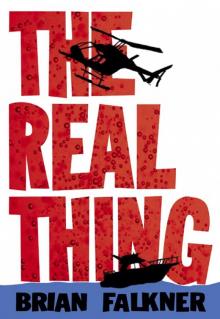 The Real Thing
The Real Thing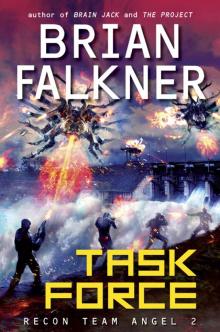 Task Force
Task Force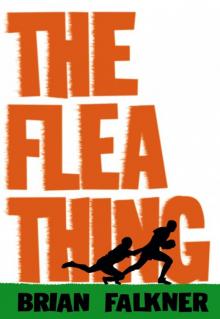 The Flea Thing
The Flea Thing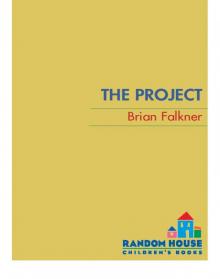 The Project
The Project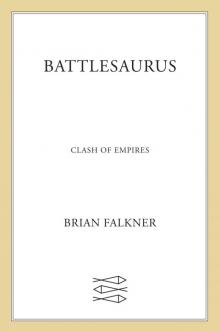 Clash of Empires
Clash of Empires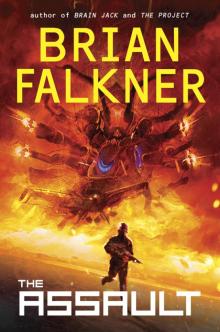 The Assault
The Assault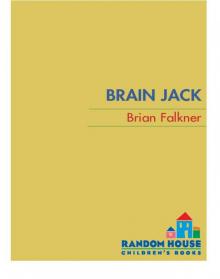 Brain Jack
Brain Jack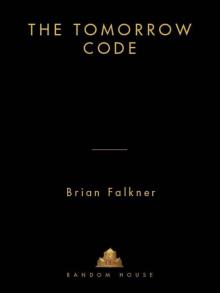 The Tomorrow Code
The Tomorrow Code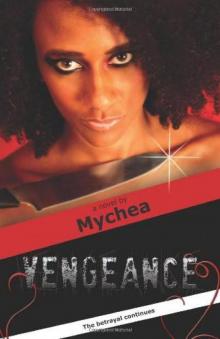 Vengeance
Vengeance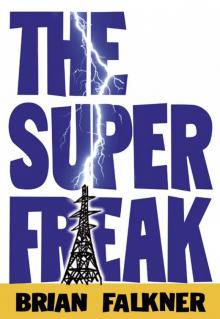 The Super Freak
The Super Freak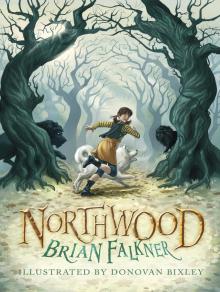 Northwood
Northwood Cave Dogs (Pachacuta Book 1)
Cave Dogs (Pachacuta Book 1)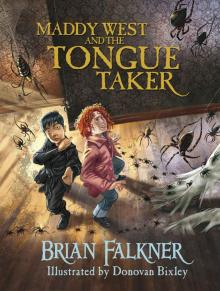 Maddy West and the Tongue Taker
Maddy West and the Tongue Taker